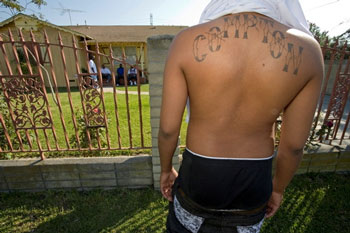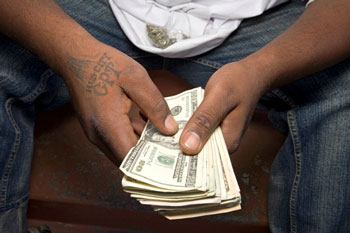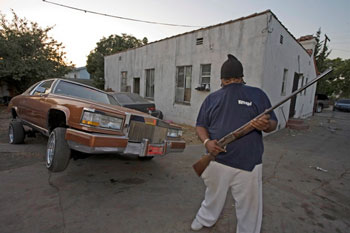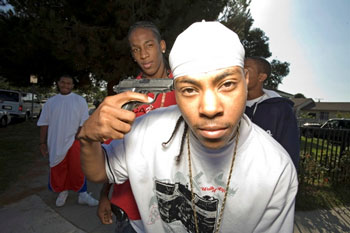 |
Compton, California:
Gangster For Life November 2006
|
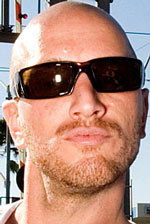 |
||||||||||||
|
Growing up as an angry youth, Gangster Rap music resonated well with me. The violence and anti-authority attitude delivered through the lyrics were just the energy and motivation I needed to overcome the times when I felt alienated, persecuted and/or discriminated against for being different.
Earlier in the year I had completed a story on a world-famous pimp who was friends with Snoop Dogg. Snoop Dogg's friend OG Daddy V provided the credibility -- I provided the charm.
It wasn't easy; the boyz in the hood weren't interested in cooperating no matter how much they liked me. They suggested that since pretty much all their activities were punishable as felonies, why would they be interested in risking jail time? They also said gang banging and hustling drugs isn't to be bragged about or glorified: they are survival skills. I have always had this feeling that I can fit in wherever I want. Even though I am white and carry a big camera in my hand I knew that the fellas in the hood and I had something in common. Maybe it was our common experience of being angry youths. Who knows? I just decided to hang out on the block and believed I belonged. Of course trying to belong had it consequences -- I was almost beaten up and robbed by some guys who tried to lure me into an alley, I even had a fully loaded gun put to my head in broad daylight. After that experience the story just started to unfold. I was startled at what I found! I figured after all the years of fame and attention Compton would have been a much safer place.
Only 10 square miles in size, Compton is home to some 57 active gangs and patrolled by only around 80 L.A. County sheriffs. In recent weeks multiple homicides, including the killing of a 10-year-old boy and his father, have shocked the city. A family member of the victims describes everyday life like this: "These young men are just killing each other. If you look at them wrong, they just shoot."
Compton was put on the map in 1988 when the gangster rap group NWA (Niggaz with Attitude) released their best-selling album, "Straight Outta Compton." The city has been considered the home of hard-core street gangster lifestyle by the rest of the world ever since. Numerous rap artists have told the story of Compton's rough streets to the world, helping create a hype around "gangsta-style" living that even changed the face of today's youth culture. None of that has benefited the people of Compton, though.
Many citizens and gangsters alike complain that throughout the years rap artists have made money and their fans have enjoyed albums describing the tough life in Compton without substantially giving back to the city. "Why is a community that for years has been screaming for help being ignored?" asks OG (Original Gangster) Daddy V, a struggling up-and-coming rapper raised in the Farm Dog Crip neighborhood. He says that nothing has changed over the years. "Compton is crazier than ever; the killers are getting younger and younger. I mean, everybody has heard of Compton, its gangs, its murders. Where are the opportunities? When you're born and raised on the block that's all you know. If someone doesn't come in and teach you different, how can you change? How?"
I would have to immediately ask, "Where is your heater (gun)? Can I see it?" The reaction was always the same. "What? First your gonna show up in Compton, white, then after knowing me for five minutes you wanna see my gun? Man you're as crazy as they kept telling me." Rejection after rejection. Nobody was willing to show me their guns. I told Daddy V this was crazy. "Everybody here packs heat (has a gun) and nobody wants to flash?" Daddy V responded how it is, "They only pull 'em if they is gonna shoot!" At this point Daddy V had run out of time to share with me. He had made the initial introductions but it was up to me to make it happen.
After a few days in Compton I was feeling more and more comfortable. I was actually pulling up to street corners full of home boys, getting out of the car and promptly introducing myself and asking the question, "Who got a gun?" Normally this could get you shot but I seemed to take them by such surprise they were startled. In one circumstance a man replied, "You wanna see a gun? You wanna see gangsta?" He pulled the gun from his waistband and pushed it to my forehead and said, "Now that's gangsta!" After he removed the gun from my head, I didn't cut and run. I figured if he wanted to kill me he had had his chance. Later, he let me photograph him with his weapon.
Meanwhile, many others cite the dangers of the Compton streets. Strype, a hustler, says: "People look to set you up and rob you for your money or whatever. It's hard enough trying to make ends meet but you spend your life on the streets in Compton looking over your shoulder. People in regular cities just don't have to worry about this type of stuff. But here you always gotta watch your back. There is only so much money to go around, man, and when one man starts getting rich others get jealous." Chubb, a Farm Dog Compton Crip, who sells weed off the driveway of his parents' home adds, "Compton is hot, man, dangerous!"
Even though this year murder numbers are down, according to Chubb, Compton is deadlier than ever. "See, we used to stand on the block all day hanging in the front yards of our homes, front porches, etc. Niggaz can't do that anymore. Somebody will just drive by and POP, POP, POP you gonna get shot up. Brothers are in hood houses now, sittin' inside playin' cards, dominos, drinkin' and smokin'. On nice days we sit in the backyard and sell dope. Everywhere we go we gotta be strapped (carry a gun). This isn't a glamorous lifestyle to be glorified."
The sad thing is, far too many people think differently. Is the global marketing of gangster rap and fashion turning out to be Compton's biggest curse, marking the city's inexorable decent into everlasting gang hell? The bitter fact is, there is little hope that the cries for help emerging from the community will be heard any time soon. Not as long as the rest of the planet doesn't care about a minority issue in some black 'hood or hits the dance floors wearing gangster rap's latest sneakers and believes Compton is a real cool gangsta's paradise. How did OG Daddy V. put it? "If someone doesn't teach you different, how can you change?" Looks like Compton at the moment is missing devoted teachers.
© Mark Allen Johnson
Dispatches are brought to you by Canon. Send Canon a message of thanks. |
|||||||||||||
Back to November 2006 Contents
|
|
